There are many SEO metrics you can monitor to gauge the progress of your search engine optimization campaign.
However, not all of them are equally important.
This post will discuss the fifteen most important ones and how to track them.
By keeping an eye on these KPIs, you can ensure that your SEO efforts are paying off and helping you achieve the desired results.
Contents:
Total Clicks
It is the number of times users have clicked your links on search engine result pages.
You can check your data in Google Search Console, under the “Performance” tab:
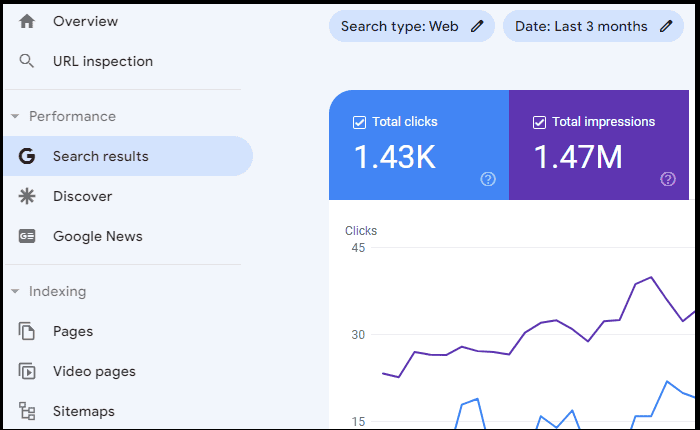
What I suggest 
Referring Domains
The number of new referring domains tells you how many unique websites link to your site (and the anchor text used).
Backlinks are among the top three ranking factors used by Google, and if people are mentioning your content, it means you are doing something right.
You can check this SEO KPI using a tool like Ahrefs or SEMrush.
For example, Airbnb has more than 146k referring domains, according to Ahrefs:

Pay attention to this metric, instead of the total number of backlinks.
Google is giving less weight to a link from the same site.
And remember.
If this score is going up, it means your content marketing and link-building efforts are working.
What I suggest 
Check via Ahrefs Site Explorer
Domain Authority
Domain Authority (DA) measures the strength of your website and is determined by factors such as age, popularity, and size.
This is a rough indication of how well your website is doing in search engines.
If you have a high score, it means that you earned some good backlinks and have grown your authority.
You can check the DA of your domain via the Moz tool, for free:

What I suggest 
Download the Moz Chrome extension
Click-through Rate (CTR)
Your click-through rate (CTR) measures how often people who see your listing in the search results click on it.
This KPI gives you an idea of how interested people are in your website when they see it in the search results.
If you have a high CTR, it means that users are more likely to click on your listing (for example, having your content included in SERP features and as a rich snippet), which can help you get more traffic to your site.
You can check this metric in Google Search Console under the “performance” tab:
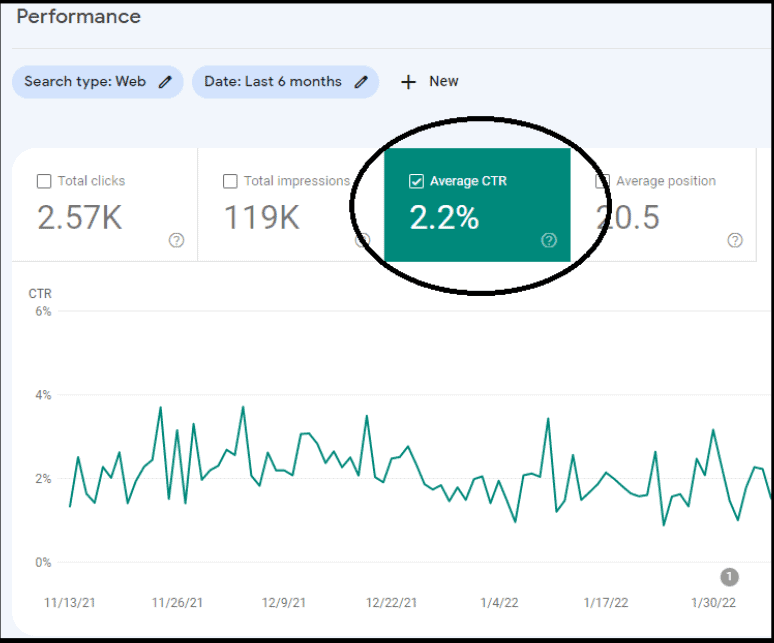
What I suggest 
Keyword Rankings
Did you know that on average, the top-ranking pages usually rank in the top 10 results for around 1,000 other relevant keywords (Ahrefs)?
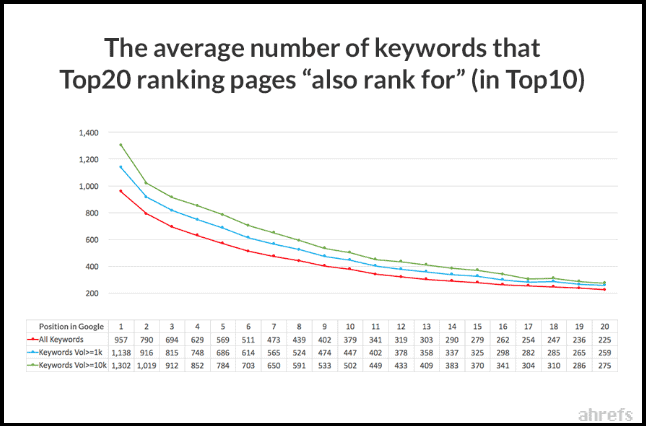
Keyword rankings will tell you how well your site is performing for specific terms that you are targeting.
By tracking this metric, you can see which terms are working well for you and which ones aren’t.
You can then adjust your SEO strategy accordingly to focus on the ones that are giving you the best results.
You can track this using a tool like Ahrefs or SEMrush.
For example, here’s how it looks the “organic keywords” tracking feature of Ahrefs, under the “organic search” tab:
![]()
Also, you may want to read this post about how to check Google rankings (6 free SEO tools mentioned).
What I suggest 
Check via Ahrefs Site Explorer
Organic Traffic
Organic traffic measures the number of visitors coming to your site from organic search results.
Of course, it’s a good indication of how well your website is performing in the search engines.
If you have a lot of organic traffic, it means that people are finding your site when they search for specific keywords.
In GA4, go to “Life cycle”, “Acquisition” and “User Acquisition”.
Then, filter by “source/medium” and write “organic” in the search bar to check the traffic from all search engines:
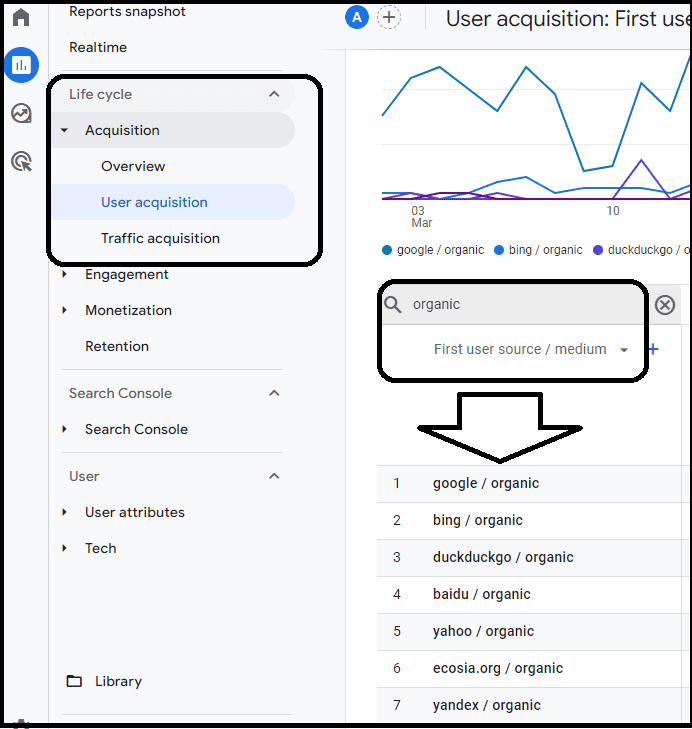
Organic traffic differs from the number of total clicks because it takes into consideration all the search engines (including Bing, for example, or Baidu).
What I suggest 
Core Web Vitals
Core Web Vitals are performance metrics that track things like speed, loading time, and stability.
If you see a sudden decrease in your Core Web Vitals, it could be a sign that something is wrong with your website and you need to investigate further.
You can study and improve them by visiting the Google Search Console:
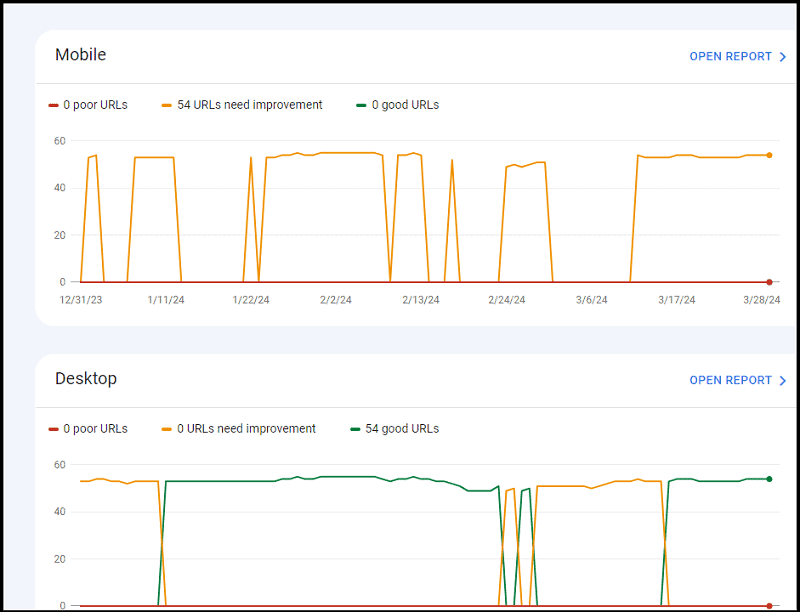
What I suggest 
Bounce Rate
Bounce rate measures the percentage of people who leave your site after only viewing one page.
In GA4, you can no longer access this metric.
So, in Google Analytics 4, the bounce rate is the percentage of sessions that weren’t engaged sessions.
In other words, the Bounce rate is the inverse of the Engagement rate.
What I suggest 
Dwell Time
Dwell time is the amount of time that a user spends on your website after clicking on your result on the search engine results page.
It indicates how interesting and relevant your site is to the user.
A long dwell time means that people found your site to be useful and informative.
On the other hand, a short dwell time could mean that the visitor did not find what they were looking for on your site or that your site was not relevant to their query.
To improve it, you can make sure that your website is relevant to the user’s query and that it contains informative and interesting content.
There’s no specific way to monitor your dwell time, but you can use Google Analytics 4 to track a similar metric, which is the “Avg. Engagement Time”.
Same as before, go to “Life cycle”, “Acquisition” and “User Acquisition”.
Then, filter by “source/medium” and write “organic” in the search bar to check the traffic from all search engines:
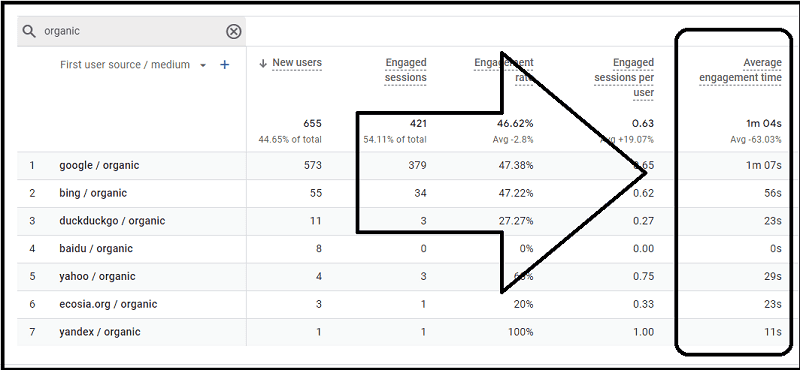
What I suggest 
Crawl Errors
These are problems that prevent search engines from being able to crawl and index your site properly.
Did you know that Crawl errors can hurt your performance in search results?
If you see a sudden increase in this KPI, it’s a sign that something is wrong with your website and you need to investigate further.
You may check them by visiting Google Search Console, under the “Craws Stats” tab:
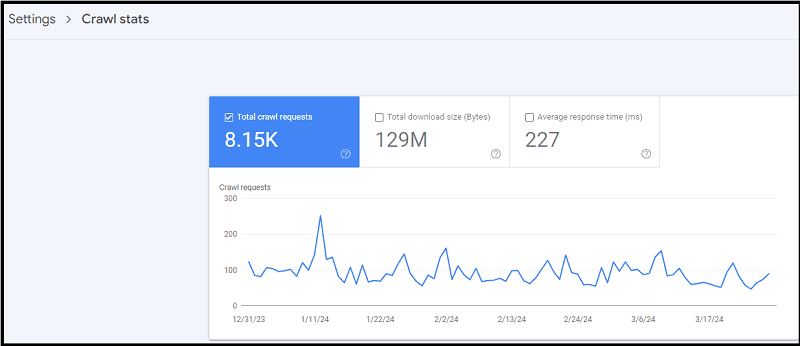
What I suggest 
On-Page Optimization Score
The on-page optimization score is a metric that analyzes how well you have optimized your site for search engines.
By monitoring it, you can see which areas need improvement and make the necessary changes.
To check your on-page optimization score, you can use a tool like Moz Pro:
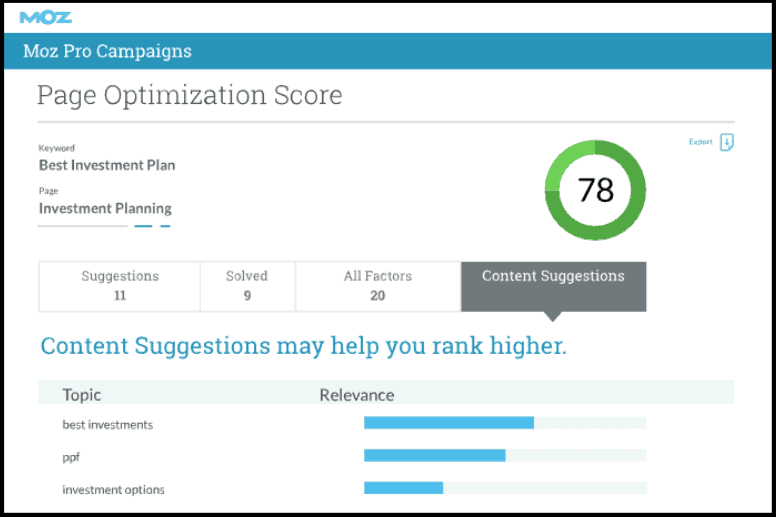
What I suggest 
Download the SEO Minion Chrome extension
Page Loading Time
Page loading time measures how long it takes for your pages to load when people visit your site.
This is essential because loading speed is a ranking factor.
Of course, if your pages take too long to load, it could hurt your rankings.
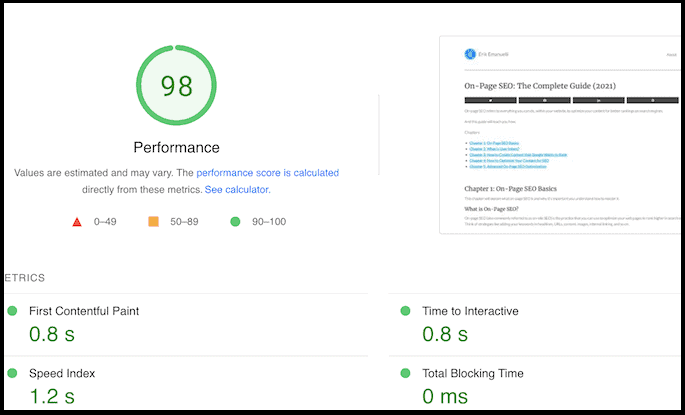
What I suggest 
Analyze via PageSpeed Insights
Indexed Pages
Indexed pages measure how many of your website’s pages have been indexed by search engines.
This gives you an idea of how well your website is being crawled and indexed.
If you see a sudden decrease in this value, it’s a sign that something is wrong with your content and you need to investigate further.
Check this metric by going to Google Search Console and clicking on the “Coverage” tab:
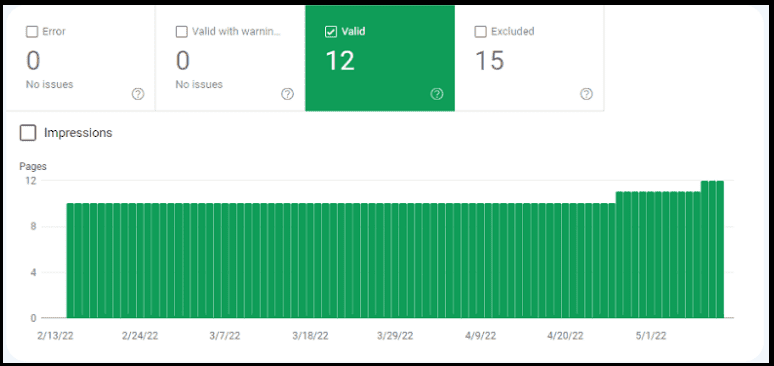
What I suggest 
You can also use Google to check all the pages indexed on your site by using this search operator:
site:yoursite.com
Conversions
Conversions measure how often people who visit your site take the desired action.
This gives you an idea of how effective your website is at achieving its goals.
If you’re not getting a lot of conversions, it could be a sign that your CTAs need to be improved, for example.
In GA4, you can set up key events:
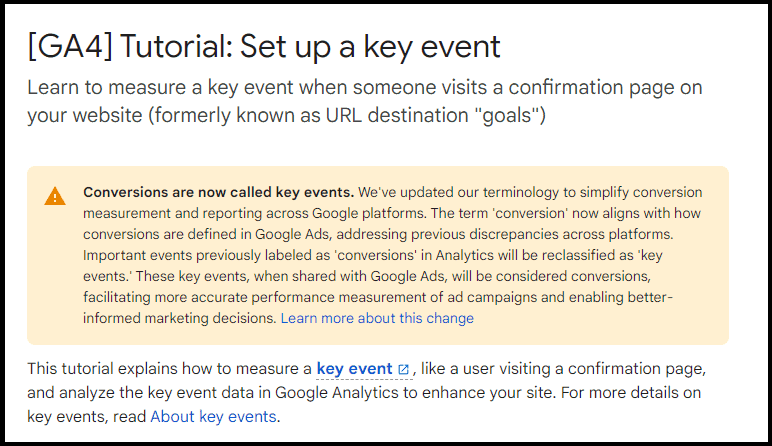
Impressions
An impression is defined as an instance where your website appears in the search engine results pages.
Your website can appear multiple times in the SERP for a single query, and each time it appears, it counts as an impression.
You can track this metric using Google Search Console.
Once you’re there, select the Performance tab to view the “Total impressions“:
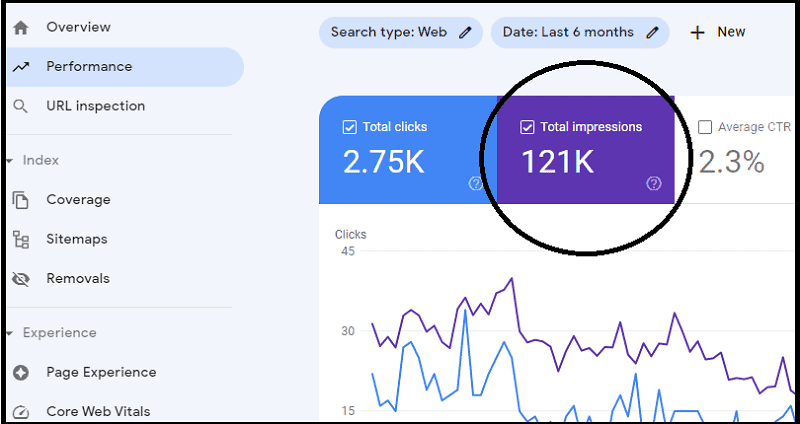
What I suggest 
SEO Metrics FAQs
Q: What are the SEO metrics?
A: SEO metrics are a set of measurements that help you track and measure your website’s performance in search engine results pages.
Q: What are the most important metrics in SEO?
A: The most important metrics in SEO are page loading time, indexed pages, crawl errors, on-page optimization scores, impressions, and, of course, the number of unique websites linking to your content.
Q: Are SEO metrics the same as SEO KPIs?
A: Yes, SEO metrics are essentially the same as SEO KPIs. The only difference is that KPIs measure the performance of your website’s overall search engine optimization strategy. Metrics, on the other hand, measure more specific aspects of your site.
Q: How do I know my SEO is good?
A: You can measure the success of your SEO efforts by tracking the above-mentioned metrics. If you’re seeing an increase in impressions, conversions, and indexed pages, then it means that your SEO is somehow working.
Q: Is age a factor in SEO?
A: Yes, age is a factor in SEO. Older websites tend to have more authority, so they can rank higher in search engine results pages. However, age is just one of many factors that affect a website’s ranking.
Q: How to predict SEO traffic?
A: It’s difficult to accurately predict SEO traffic. However, you can get an idea of what your future traffic might look like by tracking the above-mentioned metrics over time. If you’re seeing a consistent increase in impressions, conversions, and indexed pages, then it could be a sign that your website will experience more organic traffic in the future.
Q: What are some tools to track SEO metrics?
A: Some of the best tools to track SEO metrics are Google Analytics, Search Console, Moz, and Ahrefs. These tools can help you monitor all of your website’s SEO metrics in one place and provide valuable insights into how well your site is performing. Also, don’t forget the useful Chrome extensions for SEO available.
Q: How often should I check my SEO metrics?
A: It’s best to check your metrics regularly. The frequency of checks will depend on the size and complexity of your website, but generally, it’s best to check at least once a month. This way you can stay up-to-date with changes in the search engine results pages and adjust your SEO strategy accordingly.
Before You Go
These are among the most important SEO metrics that you should be tracking.
By monitoring them, you can get a better idea of how well your website is performing and make changes accordingly.
But wait.
Since you want to rank better on Google, how about reading these guides too?
Now, over to you.
Are you monitoring some SEO KPIs on your website?
Which of them is the most important, in your opinion?
Please share your insights in the comments below, thanks!


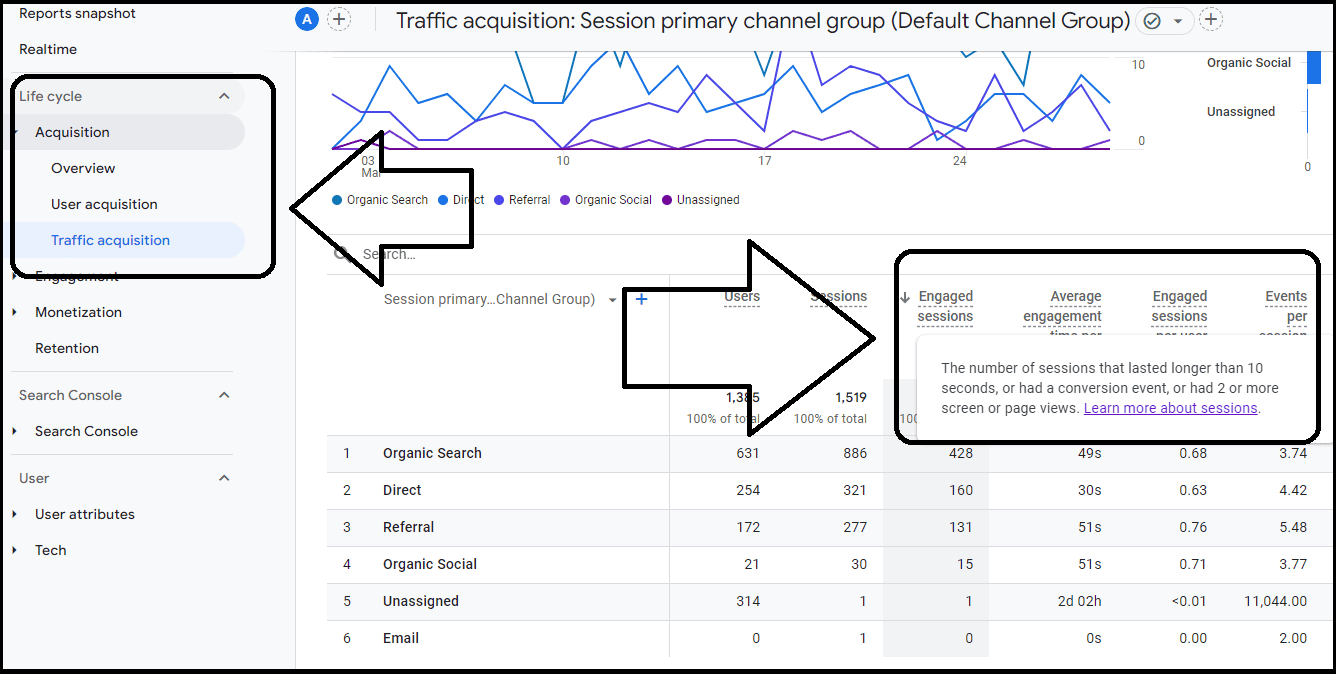
Recently, I have been paying close attention to Google page speed insights, most especially after adding a new script or widget to my blog. The Google search console is also my go-to platform to see how my posts are getting ranked and also see some keywords that I can use to tweak existing posts for better ranking.
Above all, I really love this article, and I will be bookmarking the page to read it allover again later. Thanks
Hi Allen,
you may want to check my Core Web Vitals guide:
https://erikemanuelli.com/core-web-vitals/
And this article on how to improve page loading speed:
https://erikemanuelli.com/page-speed/
Thanks for the awesome feedback and I hope you stick around! 🙂
PageSpeed Insights has also been my big go-to over the past yrear, as well as Speed Vitals, to measure TTFB.
I am frustrated with this new Google Analytics that is so clunky compared to the old universal analytics. I wish they hadn’t made us change.
Genesis Framework really helps me in getting almost a perfect score on the PageSpeed Insights tool (99%).
Other than that (and probably more important) is the hosting I use, WPEngine.
I’m starting to like the new GA4. I often check my site stats on mobile via the iOS app. It’s handy!
A must-read for anyone looking to enhance their SEO game. Thanks for sharing these insights!
Thanks for the great feedback, Charlie.
Hi Erik,
Thanks for this comprehensive guide to SEO metrics. My goal has been to get more traffic to my site, and your detailed article will help me. I find it all confusing, but I will go through your post with a fine-tooth comb.
Hi Julie,
I appreciate the good comment and it’s my pleasure if this post may help you in any way. 🙂